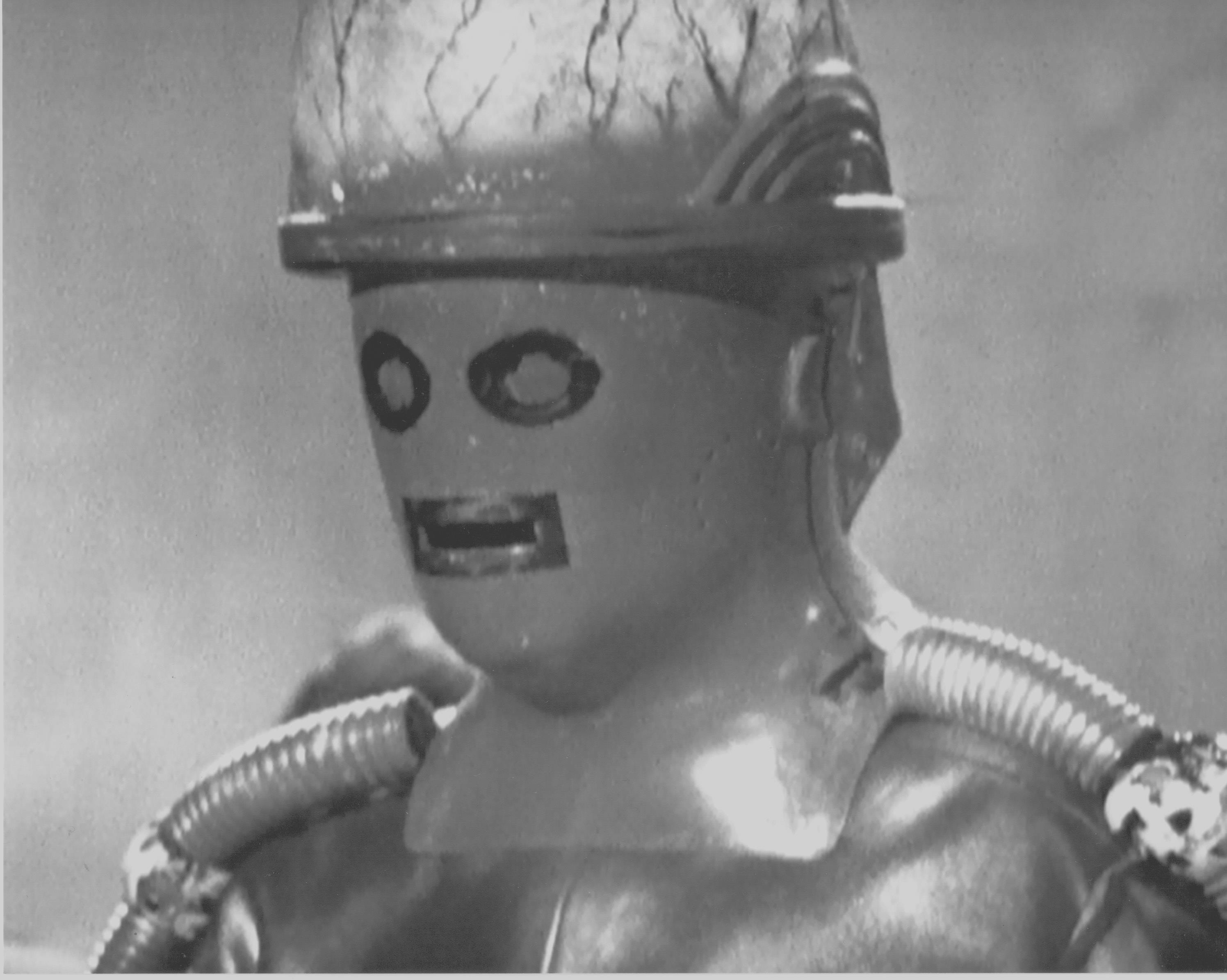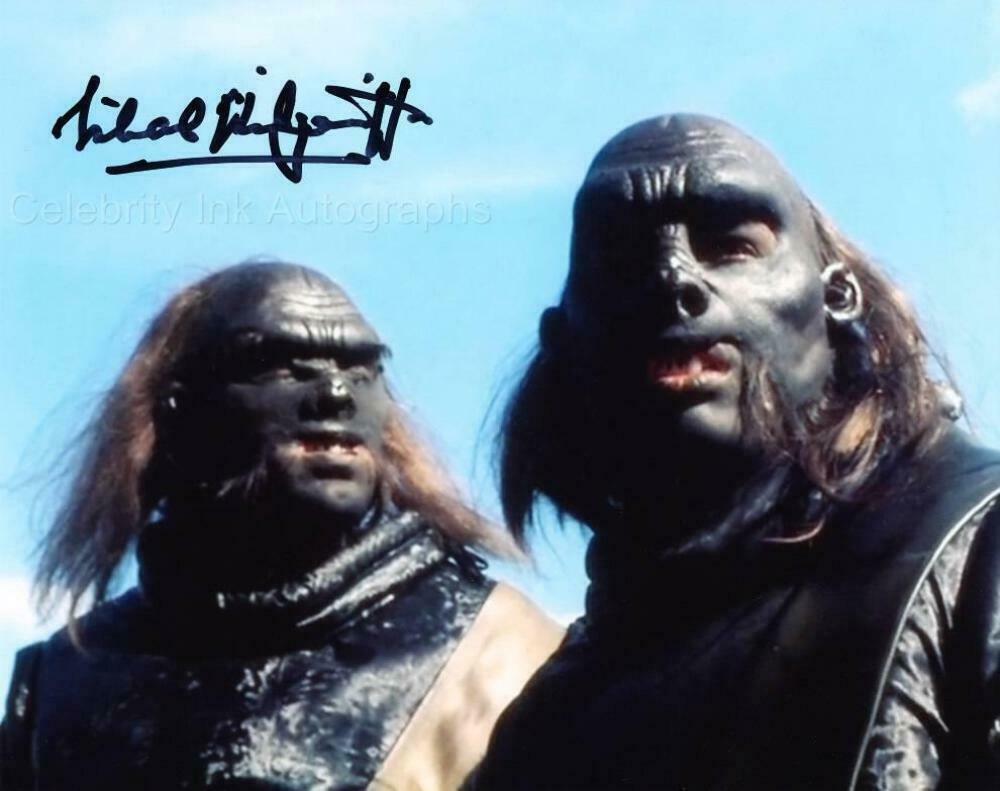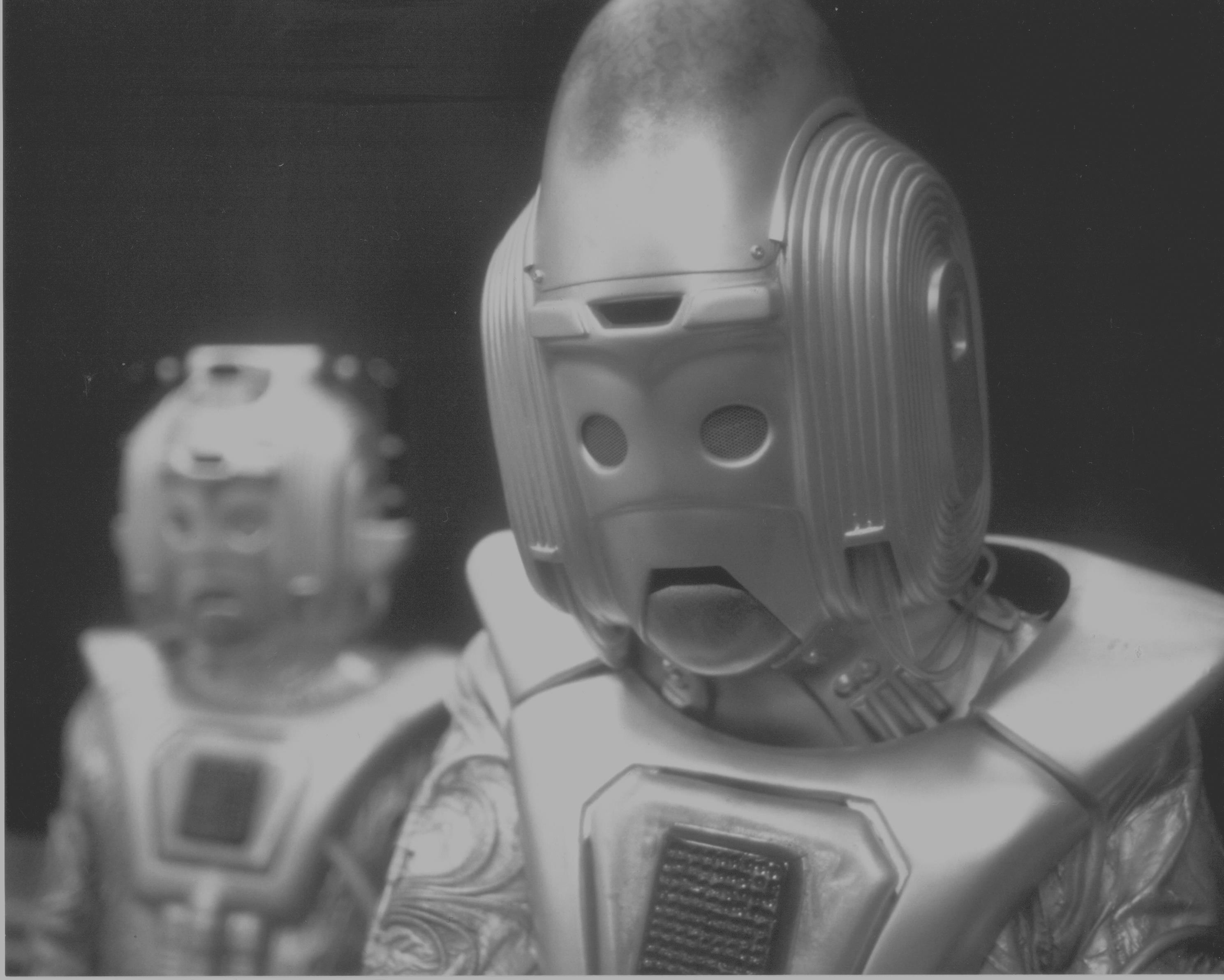RECOLLECTIONS OF
FOUR DOCTORS
(& THE DARK CRYSTAL)
TOMB OF THE CYBERMEN 1967(& THE DARK CRYSTAL)
 Patrick Troughton remains my favourite
Doctor. He was always slightly sinister, and he
never tried to be lovable or quaintly
eccentric. He once gave an excellent
performance in a play I wrote for BBC Radio 4 so perhaps I
am biased.
Patrick Troughton remains my favourite
Doctor. He was always slightly sinister, and he
never tried to be lovable or quaintly
eccentric. He once gave an excellent
performance in a play I wrote for BBC Radio 4 so perhaps I
am biased. When I was booked for Tomb my agent told me the BBC were offering what was called a 'special low' fee, because I didn't have to speak any dialogue. At that time technology didn't allow for mics under the costume, so the Cybercontroller's lines were spoken by Peter Hawkins - the ranking voice-artist of the day - into a hand-held mic off-camera. I argued that although I didn't have to say the lines I had to learn them in order to synch the mouth movements with a chinstrap. This argument was accepted and I got my full fee, but when I played the part for Attack of the Cybermen eighteen years later and was able to speak my own lines the rectangular mouth had been forgotten. Also the transparent skull with its pulsating brain had gone, leaving me indistinguishable from my subordinates.
As technicalities developed exponentially so demands on the actor intensified, with positioning and eyelines ever more critical. Today's Dr Who is light-years in advance of anything I experienced, with jaw-dropping special effects on a level once only seen in Hollywood movie blockbusters. Sets are far more hi-tech, lighting more complex, and the plots and dialogue far more sophisticated, perhaps because the target audience is as much adult as juvenile. And of course there is colour.
At 6' 5" I have often worn monster-type rigs, both on stage (mostly in pantomime) and on TV. A problem with being thus encased is that people tend to forget there is anyone inside. For instance, when I was electrocuted in Tomb and crashed to the floor, all the lights went out and the studio swiftly emptied. It was 4 o'clock, tea-break time for the crew, and I was abandoned, threshing about like a stranded whale. Another problem is that dressers tend to get you fully kitted up far too soon. It's difficult to argue as they're given a rap over the knuckles if you’re not ready when needed. Eventually I developed a personal zen, enabling me to switch off during waits.
FRONTIER IN SPACE 1973
 In this story I
was Second Ogron, with First Ogron played by my old friend
the late Stephen Thorne whose mordant humour I had always
enjoyed. The costume was a gorilla-type body with,
mercifully, easily detachable head and hands.
I never really understood Ogrons. They were
kept in cages and could scarcely speak, yet they could
pilot space-ships. Go figure.
In this story I
was Second Ogron, with First Ogron played by my old friend
the late Stephen Thorne whose mordant humour I had always
enjoyed. The costume was a gorilla-type body with,
mercifully, easily detachable head and hands.
I never really understood Ogrons. They were
kept in cages and could scarcely speak, yet they could
pilot space-ships. Go figure.The Master, an evil Time Lord and long-standing foe of the Doctor’s, was played by Roger Delgado with whom I had worked on many radio drama productions as well as a Prom concert at the Royal Albert Hall. He was one of the sweetest-natured men I have ever known, and his untimely death while on location in Turkey was an utter tragedy.
Of Jon Pertwee I can only say that he was a pain in the fundament. He was so demanding, needy and noisily temperamental in front of cast and crew that for the first and only time in my career I felt ashamed to be an actor. Katy Manning, despite having her own performance as his companion to worry about, took it upon herself to soothe his excesses and keep him calm.
 This aluminium
monstrosity didn't take long to put on but it was
exceptionally heavy and unwieldy to work in. I fell
over several times due to the long segmented feet and by
the time the week’s filming was finished I was bruised and
cut and very tired. In fact when I got home to West
London - the filming was at the BBC's engineering
establishment outside Evesham - I had nightmares
about being trapped in a midget submarine; the next
morning my legs refused to support me and it wasn’t until
lunchtime that I was fully mobile.
This aluminium
monstrosity didn't take long to put on but it was
exceptionally heavy and unwieldy to work in. I fell
over several times due to the long segmented feet and by
the time the week’s filming was finished I was bruised and
cut and very tired. In fact when I got home to West
London - the filming was at the BBC's engineering
establishment outside Evesham - I had nightmares
about being trapped in a midget submarine; the next
morning my legs refused to support me and it wasn’t until
lunchtime that I was fully mobile. Tom Baker was friendly, ebullient and a lot of fun. I have always felt he was not well-served by the director in the closing scenes, where he displays too much noisy triumphalism as the huge metallic entity crumbles to dust. The enchanting Elisabeth Sladen’s soulful gaze up at me as the bewildered Robot struggles to cope with inchoate emotions remains a powerful memory.
The Robot remains my favourite Dr Who rôle because the writing gave him the opportunity to change. Usually a baddie is a just baddie and that’s that, but as the Robot developed a degree of sentience it/he became a far more complex character than the usual soulless frightener.
The production ran into two strikes, one by BBC prop men and one by floor-managers, delaying the recording dates, so although contracted for four episodes I was paid for ten.
ATTACK OF THE CYBERMEN 1985
 Again
I played the Cybercontroller, but other than getting a
difficult and painful backfall in the can on the first
take I have no significant memories of this story, or
indeed of the perfectly pleasant if somewhat bland Colin
Baker, though as mentioned above due to technical advances
I was able to speak my own lines (as was the case with The
Robot). After transmission there was a minor media
controversy over a scene in which a Cyberman, on my
signal, squeezed Maurice Colbourne’s hand until the
blood spurted. This gruesomeness was discussed on
BBCtv’s Points of View, and in Australia was edited
out. I suspect it wasn’t so much children as their
parents who complained.
Again
I played the Cybercontroller, but other than getting a
difficult and painful backfall in the can on the first
take I have no significant memories of this story, or
indeed of the perfectly pleasant if somewhat bland Colin
Baker, though as mentioned above due to technical advances
I was able to speak my own lines (as was the case with The
Robot). After transmission there was a minor media
controversy over a scene in which a Cyberman, on my
signal, squeezed Maurice Colbourne’s hand until the
blood spurted. This gruesomeness was discussed on
BBCtv’s Points of View, and in Australia was edited
out. I suspect it wasn’t so much children as their
parents who complained. AUDIO-BOOKS
Tomb of the Cybermen (2012)
The Seeds of Doom (2019)
THE DARK CRYSTAL 1982
On one occasion over lunch at Elstree Studios the producer, Gary ‘Star Wars’ Kurtz, asked me what I thought of the picture. ‘Wonderful!’ I enthused, ‘but I’m puzzled as to why the girl gelflings can fly but the boy gelflings can’t.’ ‘Yes, we’re working on that,’ he said, to which I replied, ‘I thought it was perhaps because the girls were born with wings and the boys were born without...’ ‘That’s it!’ he exclaimed. ‘You got it!’